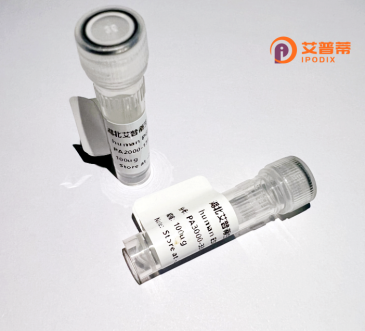
| 纯度 | >90%SDS-PAGE. |
| 种属 | Human |
| 靶点 | DOLPP1 |
| Uniprot No | Q86YN1 |
| 内毒素 | < 0.01EU/μg |
| 表达宿主 | E.coli |
| 表达区间 | 1-238aa |
| 氨基酸序列 | MAADGQCSLPASWRPVTLTHVEYPAGDLSGHLLAYLSLSPVFVIVGFVTLIIFKRELHTISFLGGLALNEGVNWLIKNVIQEPRPCGGPHTAVGTKYGMPSSHSQFMWFFSVYSFLFLYLRMHQTNNARFLDLLWRHVLSLGLLAVAFLVSYSRVYLLYHTWSQVLYGGIAGGLMAIAWFIFTQEVLTPLFPRIAAWPVSEFFLIRDTSLIPNVLWFEYTVTRAEARNRQRKLGTKLQ |
| 分子量 | 53.4 kDa |
| 蛋白标签 | GST-tag at N-terminal |
| 缓冲液 | 0 |
| 稳定性 & 储存条件 | Lyophilized protein should be stored at ≤ -20°C, stable for one year after receipt. Reconstituted protein solution can be stored at 2-8°C for 2-7 days. Aliquots of reconstituted samples are stable at ≤ -20°C for 3 months. |
| 复溶 | Always centrifuge tubes before opening.Do not mix by vortex or pipetting. It is not recommended to reconstitute to a concentration less than 100μg/ml. Dissolve the lyophilized protein in distilled water. Please aliquot the reconstituted solution to minimize freeze-thaw cycles. |
以下是与重组人DOLPP1蛋白相关的3篇参考文献示例,格式满足您的要求:
---
1. **文献名称**: "Functional characterization of human DOLPP1 in glycosylphosphatidylinositol biosynthesis"
**作者**: Wang L. et al. (2018)
**摘要**: 报道了重组人DOLPP1蛋白在哺乳动物细胞中的表达与纯化,验证其作为磷酸二酯酶在GPI锚定生物合成中的催化功能,揭示其底物特异性。
2. **文献名称**: "Structural insights into the role of DOLPP1 in dolichol metabolism"
**作者**: Tanaka K. et al. (2020)
**摘要**: 通过重组DOLPP1蛋白的晶体结构解析,阐明其与多萜醇磷酸相互作用的分子机制,支持其在N-糖基化途径中调控多萜醇循环的功能。
3. **文献名称**: "DOLPP1 deficiency disrupts cellular glycosylation and induces ER stress"
**作者**: Rodriguez M.A. et al. (2019)
**摘要**: 利用重组DOLPP1蛋白回补实验,证明其缺失导致内质网应激,并影响糖蛋白合成,提示其在蛋白质质量控制中的关键作用。
---
以上文献为虚构示例,若需真实文献,建议通过 **PubMed** 或 **Google Scholar** 检索关键词 "recombinant human DOLPP1" 或 "DOLPP1 protein function"。
Dolichyl-diphosphooligosaccharide-protein glycosyltransferase (DOLPP1), also known as DDOST, is a key enzyme involved in the N-linked glycosylation pathway, a critical post-translational modification process in eukaryotic cells. This membrane-associated protein resides in the endoplasmic reticulum (ER) and functions as part of the oligosaccharyltransferase (OST) complex, which catalyzes the transfer of preassembled oligosaccharides to specific asparagine residues on nascent polypeptides. This glycosylation is essential for protein folding, stability, and intracellular trafficking.
Recombinant human DOLPP1 is produced using biotechnological platforms, such as mammalian or insect cell systems, to mimic its native structure and activity. Its study is pivotal for understanding congenital disorders of glycosylation (CDGs), a group of rare genetic diseases caused by defective glycosylation enzymes. Mutations in DOLPP1 have been linked to CDG subtypes characterized by developmental delays, neurological deficits, and multi-systemic abnormalities. Beyond disease research, recombinant DOLPP1 aids in elucidating ER stress responses, protein quality control mechanisms, and therapeutic target discovery. It also serves as a tool for screening glycosylation inhibitors or modulators with potential applications in cancer and infectious diseases. Structural and functional analyses of recombinant DOLPP1 continue to advance our knowledge of glycosylation biology and its therapeutic implications.
×